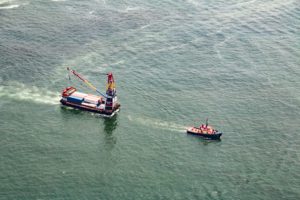Tugboats are specialized vessels tasked to help ships or other maritime structures move from one place to another on water. Tugboats are sturdy and have powerful engines, and they’re often able to perform additional roles, including firefighting and icebreaking tasks. However, these assignments are dangerous because tugboat duties involve pulling or pushing vessels or oil rigs which are unable to maneuver on their own. As a result, many tugboats and their crews get into accidents that lead to serious injuries and deaths.

Dangerous Duty: Tugboats and Accidents
Tugboats are among the busiest working vessels in the maritime industry. There are three types of tugboats: oceangoing, harbor, and river tugboats. They’re used to move larger vessels like cruise ships and container ships in the narrow channels of ports or in navigable rivers. Tugboats also assist disabled ships out at sea in emergencies. In addition, tugs tow oil rigs and other maritime-environment structures that are not self-propelled and difficult to control.
Tugboats, no matter which category they belong to, are industrial vessels and are crammed with equipment that enables them to perform their assigned tasks quickly and efficiently. The average tugboat is equipped with at least one hawser, which is a thick cable used to tow heavy loads. In most instances, tugboats use metal cable hawsers instead of the older rope types because metal has greater tensile strength. However, metal hawser lines have a tendency to snap due to the stresses they are exposed to when they’re in use. Many seamen employed on tugboats suffer serious injuries or are killed when they’re struck by a recoiling hawser if they are in the “snap-back” zone.
Hawser accidents are often caused by tugboat owners who acquire cheap or less-than-adequate parts for their vessels.Though this practice may reduce operating costs, second-hand or uncertified towing equipment is not recommended. Substandard cables or chains may not withstand the loads that they’re subjected to and break unexpectedly.
Tugboat crews are also at risk of being injured or killed in accidents involving the entire vessel. When tugboats have operational problems, they typically capsize shortly after, injuring and/or killing the workers aboard.
Common Reasons for Tugboat Accidents
- Capsizing: Capsizing is a real possibility with tugboats, and as mentioned earlier, often happens when there are operational problems with the vessel. Capsizing often leads to fatal injuries.
- Mechanical breakdowns: Mechanical failure on tugboats such as loss of power, broken ladders, and defective equipment can cause a host of accidents and injuries.
- Hazards on-board: Wet, slick surfaces, improper safety equipment, and improper training while aboard a tugboat has led to numerous accidents.
- Vessel collisions: Poorly maintained navigational gear and unqualified personnel on the bridge have led to several deadly incidents. In addition, tugboats are much smaller when compared to other vessels and can easily be obstructed from view by a larger vessel, causing tragic collisions.
Examples of Tugboat Accidents
In July of 2013, 22-year-old Tyler Trussoni was killed in a tugboat accident after the boat lost its power while navigating through the Lock and Dam No. 7 in Winona County, Minnesota. Shortly after losing power, the tugboat capsized, trapping Trussoni inside. Two other maritime workers were found with injuries, but survived.
In February of 2007, tugboat captain Piper Cameron, of Foss Maritime Company in Seattle, was operating the Emma Ross tugboat on the Marina Del Ray when she was pinched under a rope attached to a barge that her boat was pulling. Cameron went into cardiac arrest and died shortly after. Her co-worker, 38-year-old Scott Dekraii, was seriously injured after the rope swung outwards and hit him. He was taken to a local hospital where he suffered several broken bones and other bodily injuries.
Legal Help for Injured Tugboat Seamen
If you’re a seaman who was injured while working on a tugboat because of the negligence of another party, you may be entitled to compensation and benefits under general maritime law and the Jones Act. Per maritime law, you can also receive maintenance and cure regardless of how the accident occurred. For additional resources and information regarding tugboat accidents, injuries, and your legal rights and options, we invite you to fill out our form today.
For more information, refer to our articles Jones Act Lawyer and Maritime Rights and Compensation.